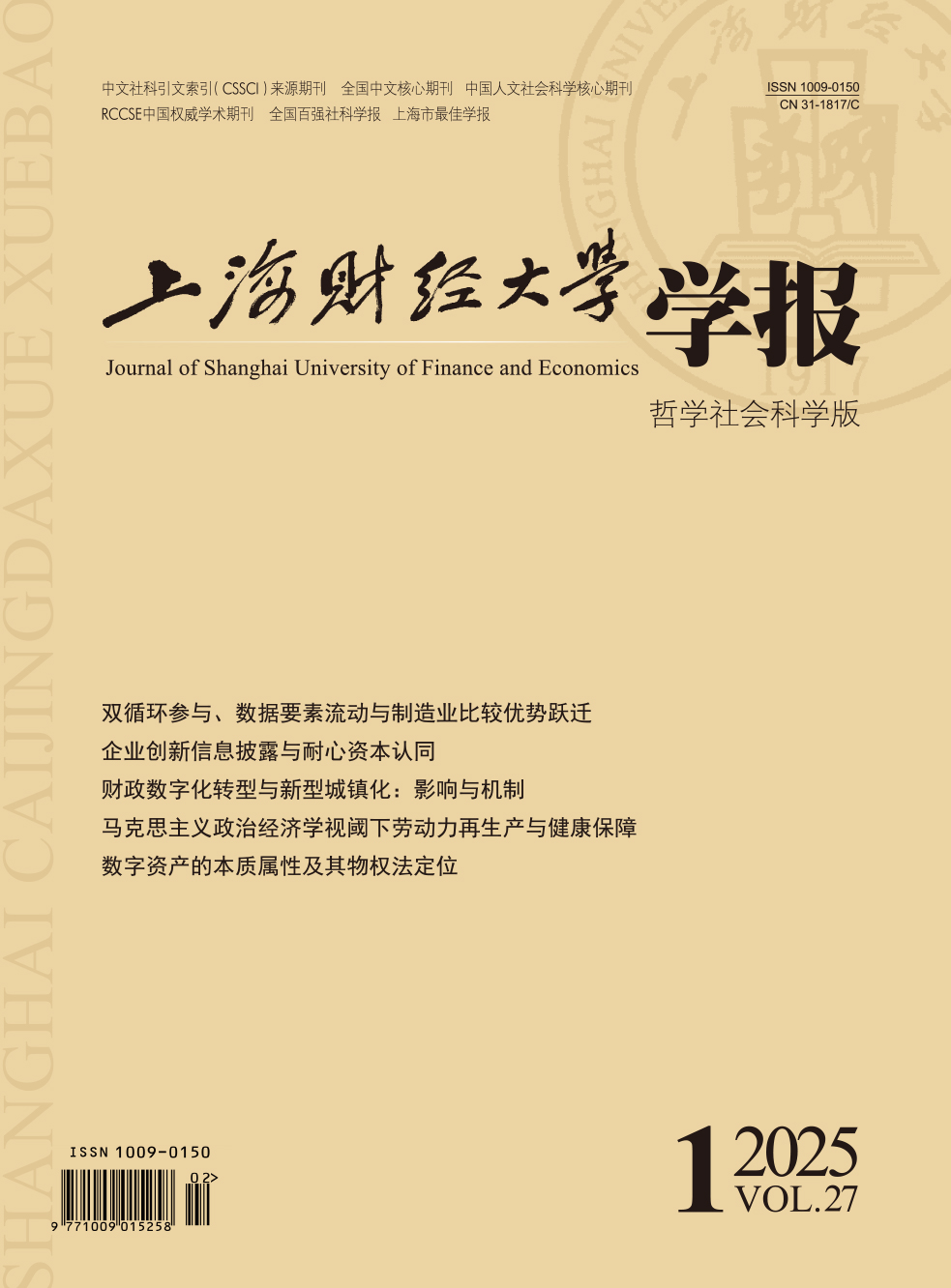文章基于2007—2019年家族企业上市公司样本,探究家族企业前任高管与继任高管盈余管理决策的路径依赖特征。回归结果表明,家族企业应计与真实盈余管理及其分项操纵均存在路径依赖。从非正式制度视角研究发现,家族二代应计与真实盈余管理路径依赖程度较低,但酌量性费用操纵的路径依赖程度较高;继任高管海外经历能够抑制应计盈余管理和生产成本操纵的路径依赖程度。从正式制度视角研究发现,激烈行业竞争能够弱化应计盈余管理、生产成本操纵和经营现金流量操纵的路径依赖程度;较高的地区制度效率可以弱化生产成本操纵的路径依赖程度。传导机制检验发现,前任高管通过降低继任高管的战略变革程度,增加继任者盈余管理路径依赖程度。研究结论为监管与治理家族企业继任者盈余管理行为,优化家族企业外部治理环境,及继任者的选拔与培养提供了经验证据。
“前车之覆乃是后车之鉴”吗:家族企业盈余管理路径依赖的实证研究
摘要
参考文献
1 蔡庆丰, 陈熠辉, 吴杰. 家族企业二代的成长经历影响并购行为吗——基于我国上市家族企业的发现[J]. 南开管理评论,2019,(1). DOI:10.3969/j.issn.1008-3448.2019.01.004
2 陈冬华, 祝娟, 俞俊利. 盈余管理行为中的经理人惯性——一种基于个人道德角度的解释与实证[J]. 南开管理评论,2017,(3). DOI:10.3969/j.issn.1008-3448.2017.03.004
3 杜善重. 家族企业创新投入中的“非家族力量”——基于股东治理的视角[J/OL]. 南开管理评论, 1-21. http://kns.cnki.net/kcms/detail/12.1288.F.20210426.1309.006.html, 2021-05-30.
4 杜勇, 张欢, 陈建英. CEO海外经历与企业盈余管理[J]. 会计研究,2018,(2). DOI:10.3969/j.issn.1003-2886.2018.02.013
5 樊纲, 王小鲁, 朱恒鹏. 中国市场化指数: 各地区市场化相对进程2011年报告[M]. 北京: 经济科学出版社, 2011.
6 费孝通. 乡土中国[M]. 北京: 北京大学出版社, 2012.
8 胡宁. 家族企业创一代离任过程中利他主义行为研究——基于差序格局理论视角[J]. 南开管理评论,2016,(6). DOI:10.3969/j.issn.1008-3448.2016.06.018
9 胡旭阳, 吴一平. 创始人政治身份与家族企业控制权的代际锁定[J]. 中国工业经济,2017,(5). DOI:10.19581/j.cnki.ciejournal.2017.05.010
11 李淑锦, 卢瑞琼. 基于修正琼斯模型的盈余管理实证检验[J]. 杭州电子科技大学学报(社会科学版),2011,(1). DOI:10.13954/j.cnki.hduss.2011.01.001
12 林晚发, 刘颖斐, 杨琴. 高管财务经历与企业信用评级: 基于盈余管理的视角[J]. 管理科学,2019,(4). DOI:10.3969/j.issn.1672-0334.2019.04.001
14 孙健, 王百强, 曹丰, 等. 公司战略影响盈余管理吗?[J]. 管理世界,2016,(3). DOI:10.19744/j.cnki.11-1235/f.2016.03.013
15 魏春燕, 陈磊. 家族企业CEO更换过程中的利他主义行为——基于资产减值的研究[J]. 管理世界,2015,(3). DOI:10.19744/j.cnki.11-1235/f.2015.03.013
16 许静静, 吕长江. 家族企业高管性质与盈余质量——来自中国上市公司的证据[J]. 管理世界,2011,(1). DOI:10.19744/j.cnki.11-1235/f.2011.01.014
17 许叶枚. 家文化视角下家族企业治理评析[J]. 经济问题,2011,(5). DOI:10.16011/j.cnki.jjwt.2011.05.026
18 严若森, 吴梦茜. 二代涉入、制度情境与中国家族企业创新投入——基于社会情感财富理论的研究[J]. 经济管理,2020,(3). DOI:10.19616/j.cnki.bmj.2020.03.002
19 杨畅, 李寒娜. 不完全契约、制度环境与企业绩效——基于上市公司的实证研究[J]. 山西财经大学学报,2014,(9). DOI:10.13781/j.cnki.1007-9556.2014.09.009
20 余向前, 张正堂, 张一力. 企业家隐性知识、交接班意愿与家族企业代际传承[J]. 管理世界,2013,(11). DOI:10.19744/j.cnki.11-1235/f.2013.11.008
21 张燃, 侯光明, 李存金. 论家族企业发展的路径依赖及创新[J]. 中国软科学,2003,(10). DOI:10.3969/j.issn.1002-9753.2003.10.005
23 Anderson R C, Reeb D M. Founding-family ownership and firm performance: Evidence from the S&P 500[J]. The Journal of Finance,2003,58(3):1301–1328. DOI:10.1111/1540-6261.00567
24 Bentley K A, Omer T C, Sharp N Y. Business strategy, financial reporting irregularities, and audit effort[J]. Contemporary Accounting Research,2013,30(2):780–817. DOI:10.1111/j.1911-3846.2012.01174.x
25 Cucculelli M, Le Breton-Miller I, Miller D. Product innovation, firm renewal and family governance[J]. Journal of Family Business Strategy,2016,7(2):90–104. DOI:10.1016/j.jfbs.2016.02.001
26 Davis J H, Schoorman F D, Donaldson L. Toward a stewardship theory of management[J]. The Academy of Management Review,1997,22(1):20–47. DOI:10.2307/259223
27 Eng L L, Fang H Q, Tian X, et al. Financial crisis and real earnings management in family firms: A comparison between China and the United States[J]. Journal of International Financial Markets, Institutions and Money,2019,59:184–201. DOI:10.1016/j.intfin.2018.12.008
28 Fligstein N. The transformation of corporate control[M]. London: Harvard University Press, 1990.
29 Gómez-Mejía L R, Haynes K T, Núñez-Nickel M, et al. Socioemotional wealth and business risks in family-controlled firms: Evidence from Spanish olive oil mills[J]. Administrative Science Quarterly,2007,52(1):106–137. DOI:10.2189/asqu.52.1.106
30 Hambrick D C, Mason P A. Upper echelons: The organization as a reflection of its top managers[J]. The Academy of Management Review,1984,9(2):193–206. DOI:10.2307/258434
31 Jensen M C, Meckling W H. Theory of the firm: Managerial behavior, agency costs and ownership structure[J]. Journal of Financial Economics,1976,3(4):305–360. DOI:10.1016/0304-405X(76)90026-X
32 Jones J J. Earnings management during import relief investigations[J]. Journal of Accounting Research,1991,29(2):193–228. DOI:10.2307/2491047
33 Miller D, Le Breton-Miller I. Managing for the long run: Lessons in competitive advantage from great family businesses[M]. Boston: Harvard Business School Press, 2005.
34 Miller D, Minichilli A, Corbetta G. Is family leadership always beneficial?[J]. Strategic Management Journal,2013,34(5):553–571. DOI:10.1002/smj.2024
35 North D C. Institutions, institutional change and economic performance[M]. Cambridge: Cambridge University Press, 1990.
36 Pierson P. Increasing returns, path dependence, and the study of politics[J]. American Political Science Review,2000,94(2):251–267. DOI:10.2307/2586011
37 Roychowdhury S. Earnings management through real activities manipulation[J]. Journal of Accounting and Economics,2006,42(3):335–370. DOI:10.1016/j.jacceco.2006.01.002
38 Schulze W S, Lubatkin M H, Dino R N. Toward a theory of agency and altruism in family firms[J]. Journal of Business Venturing,2003,18(4):473–490. DOI:10.1016/S0883-9026(03)00054-5
引用本文
董馨格, 韩亮亮, 董盈厚. “前车之覆乃是后车之鉴”吗:家族企业盈余管理路径依赖的实证研究[J]. 上海财经大学学报, 2022, 24(6): 93-107.
导出参考文献,格式为:





 3311
3311  2668
2668

